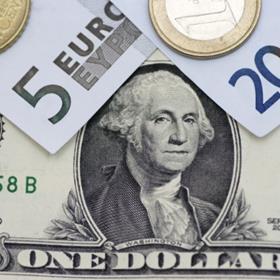
Austerity comes in many different guises. Schools remain unbuilt, civil servants suffer pay freezes, policemen are laid off, potholes go unfilled. And subsidies are cut: British Columbia’s Agriculture Minister, for example, recently had to face an irate regional association of fruit growers and explain why agricultural funding is being cut from an annual C$69m to C$67m.
Growers in the region believe they are being disadvantaged in comparison with other provinces, where funding averages C$100m, plus they are already at something of a disadvantage as a result of the Canadian dollar’s rising cost to some of their major customers. In six months, the Loonie strengthened by six-and-a-half per cent against the US dollar and appears to be establishing itself in a zone above one-for-one with the Greenback. Against the British pound the picture is less dramatic. Over the same period, the Canadian dollar has been unusually steady against the UK pound, remaining within a ten-cent band and going nowhere.
Another victim of evaporating subsidies is Horticulture New Zealand, the country’s national industry body. Growers last month decided not to approve a levy increase to offset a reduction in grants, so Hort NZ must now lay off staff and cut back on policy and research activities. But budget-trimming in Wellington pales into insignificance alongside the trauma of Christchurch’s second earthquake in six months. Having touched a record low at the start of this year, the pound was already strengthening against the Kiwi dollar when the second, more devastating quake occurred, knocking the currency as well as the city for six. The scale of the damage forced economists to revise forecasts downwards. Estimates of economic growth in the first quarter, previously set at around 0.8 per cent, were slashed to zero and the interest rate outlook also took a beating; instead of three quarter-percentage-point increases this year they now suspect there may be none at all.
In Germany, subsidies have gone up, but only to the fund set up by the European Union to rescue Greece, Ireland, Portugal and others from the effects of their past profligacy. Instead, the Germans are tackling their financial issues by buying less food. Mainly because of higher prices, they bought an average of 61.4kg of vegetables last year, down by nearly 2kg from the 63.2kg they bought in 2009.
The weakness of the euro is not to blame though. Despite a lengthening series of near-bankruptcies among its collection of economies, the euro is proving remarkably resilient. In six months, it has strengthened by more than seven per cent against the US dollar and kept pace with the pound. That strength is having an ongoing impact on exports of French apples to the UK, for example. In 2004/05, with sterling averaging a value of almost €1.47, the UK spent £89m (€130) on French apples. In 2009/10, the spend was down to €107m but, at an average exchange rate of €1.12, conversely up to £95m. French apples were 21 per cent more expensive for UK consumers, so they bought fewer.
How many they can afford in the future depends on whether the UK chancellor’s bold plan to slash the public deficit can happen without driving up unemployment and plunging the country back into recession. A factor the UK economy will almost certainly have to live with is higher interest rates this year and next. Even though a good half of Britain’s 4.0 per cent rate of inflation is the result of expensive oil and January’s VAT increase, it is likely the Bank of England will be unable to resist the pressure to be seen to be doing something about it – namely upping interest rates. In reality, that should be helpful to the pound.



